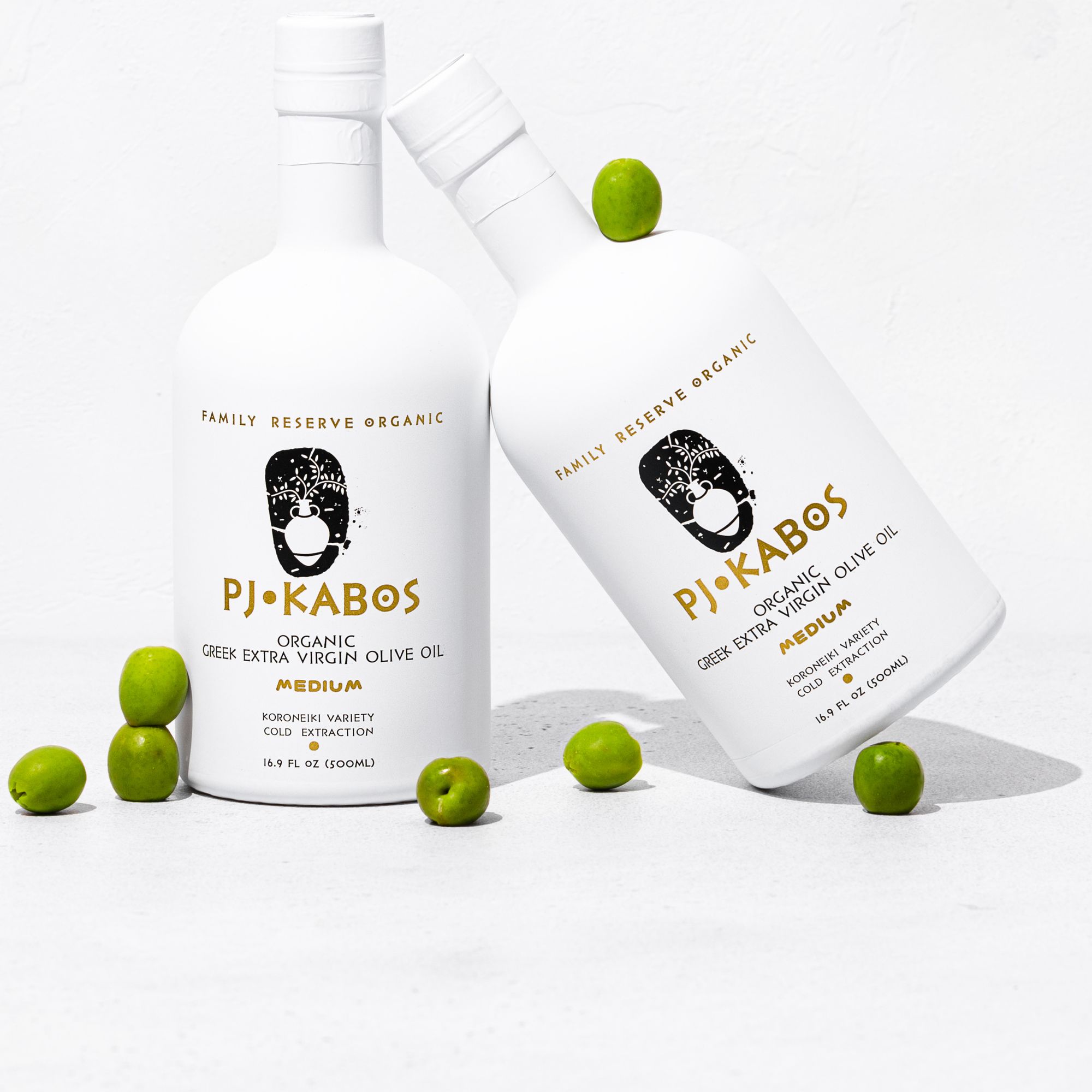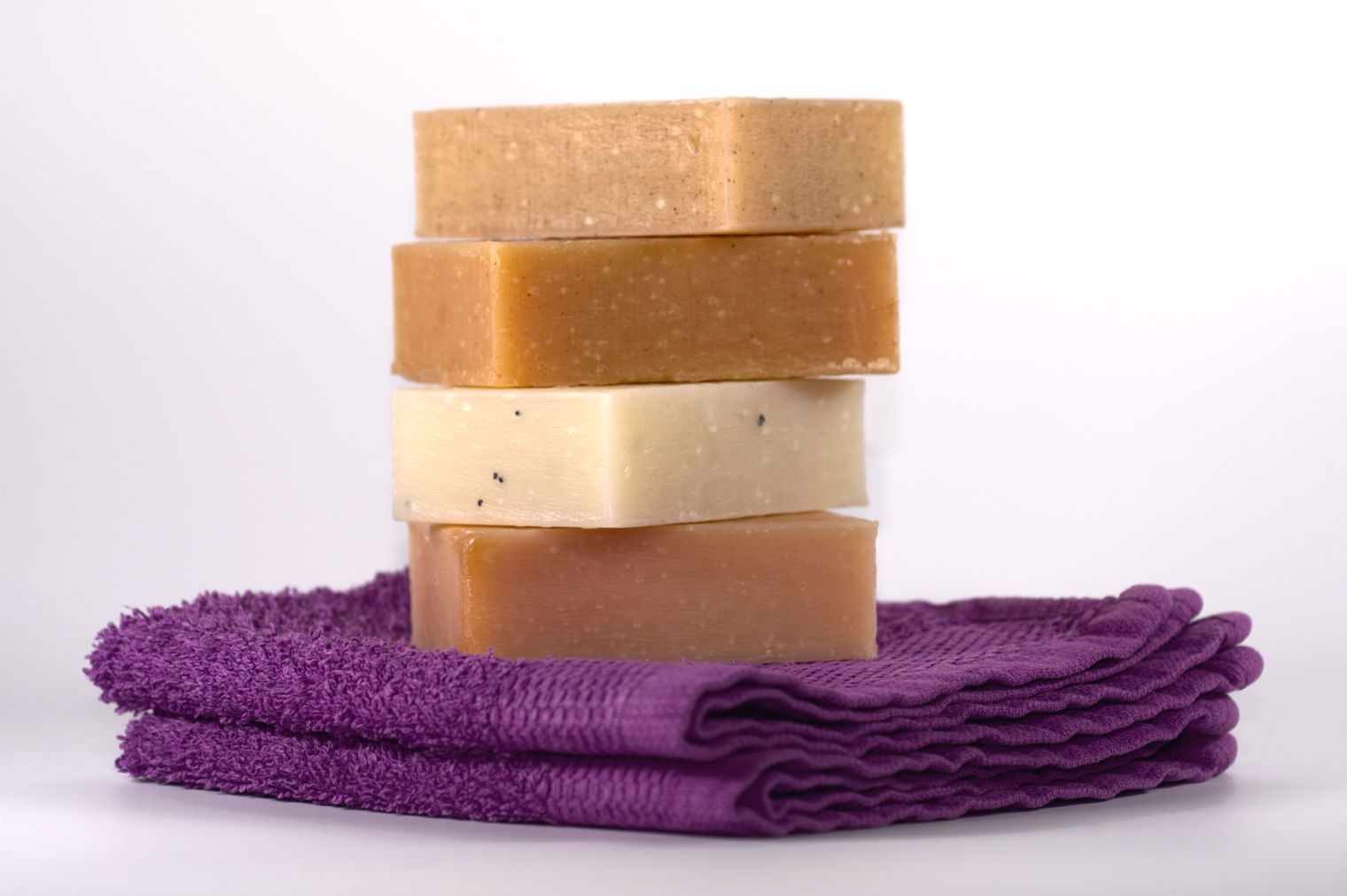There’s no question that certain fats can be seriously healthy. After all, fat is an essential macronutrient that helps you absorb other nutrients, keeps you fuller for longer, and acts as a key building block for your body’s hormones. Certain fats can even boost neurogenesis (the creation of new neurons, or brain cells) and thereby brain functioning!
Not all fats are created equal, though—and when it comes time to pick a cooking oil, things always feel so complicated! In fact, you’ve probably found yourself deliberating between olive oil and coconut oil at some point. After all, both of these oils have been dubbed “superfoods” by the media, and coconut oil has gotten a lot of love from the paleo diet and keto diet crowds lately.
But being trendy doesn’t necessarily equal bigger health benefits. Here, we break down the differences in nutrition, health benefits, taste, and culinary (+ other) uses for olive oil and coconut oil, so you can decide which deserves that primo real estate in your pantry.
Olive Oil Vs Coconut Oil: The Different Types + How They’re Made
Both olive oil and coconut oil come in several different types or grades. These can vary in terms of health benefits (which we’ll get to below), so it’s important to have a basic understanding of the different options and how they’re produced.
Types Of Olive Oil
In its simplest form, production of high quality extra virgin olive oil involves: picking and washing the olives, grinding and mixing olives into a uniform paste, separating the solids (or pomace) from the liquid oil, and filtering or racking the oil. Any processing and refinement beyond these basic steps typically results in a lower quality, less flavorful oil with fewer health benefits.
These are the main types of olive oil you’ll find in stores:
- Extra virgin olive oil (EVOO). This is the gold-standard of olive oil. It’s made via the methods described above and never exposed to chemicals or high heat during processing. This preserves its flavors, aromas, and potent bioactive compounds. Typically, the smoke point of EVOO is 350-410 F, although some brands may be a bit lower.
- Virgin olive oil. Virgin olive oil is made via the same production methods EVOO. The only difference is that virgin olive oil is allowed to have some minor flavor defects, whereas EVOO is not. Typically, its smoke point is the same as EVOO.
- Regular olive oil (or pure olive oil). Regular olive oil is made from a combination of refined olive oil and 15%-25% virgin olive oil. The refined oil may be bleached, deodorized, and refined with steam and/or various chemicals to remove defects in flavor, aroma, and color. Typically, its smoke point is around 470 F.
- Light or extra light olive oil. This is pretty much the same as regular olive oil, but it contains just 5%-10% virgin olive oil, making it lighter in flavor and color. The rest is refined oil that’s been processed with steam and chemicals. Typically, its smoke point is around 470 F.
Types Of Coconut Oil
Coconut oil is made from—you guessed it—the “meat” of coconuts. Like olive oil, it can be minimally processed or highly processed, which alters the flavor and potential health benefits. Here are the two main types of coconut oil you’ll find in stores, both of which are solid at room temperature and often sold in glass or plastic canisters:
- Unrefined coconut oil. Unrefined coconut oil refers to oil made from the first pressing of fresh, raw coconut meat without the addition of chemicals or heat. It retains a light coconut flavor and polyphenol compounds. (Unrefined coconut oil is also sometimes labeled as “virgin coconut oil” or “extra virgin coconut oil,” but there's no legal definition for these two terms in the U.S., and they often mean the same thing.) Typically, it has a smoke point of around 350 F.
- Refined coconut oil. Refined coconut oil is a neutral tasting and smelling oil, without even a hint of coconut, which makes it more versatile, but possibly less healthy. It’s made from dried coconut meat, known as copra, and often undergoes multiple levels of processing, including bleaching and deodorizing. Some quality brands, like Nutiva, use steam alone to extract and refine their coconut oil, while other brands use various chemical agents. Typically, it has a smoke point around 400 F.
Nutrient Breakdown Of Olive Oil Vs Coconut Oil
If you quickly glance at a nutrition label, olive oil and coconut oil may look similar (for example, they have the same amount of total fat), but their breakdown of specific fatty acids and bioactive compounds is actually quite different. Spoiler: Olive oil has a healthier fat profile and more bioactive compounds, including various antioxidants. Let’s take a look:
Olive Oil Nutrition
One tablespoon of olive oil contains the following, according to the USDA:
- Calories: 119
- Total fat: 13.5 g
- Saturated fat: 1.9 g
- Polyunsaturated fat: 1.4 g
- Monounsaturated fat: 10 g
- Cholesterol: 0 mg
- Total carbohydrate: 0 mg
- Protein: 0 mg
Olive oil is well known for its abundance of healthy monounsaturated fats, which have been linked to reduced inflammation and improved heart health. Specifically, olive oil’s fat content may be up to 83% oleic acid, a subtype of monounsaturated fat with anti-cancer and anti-inflammatory properties, and which has been shown to reduce “bad” LDL cholesterol. Olive oil contains very little saturated fat.
It also contains contains a variety of healthy plant compounds, including polyphenol antioxidants (oleuropein, hydroxytyrosol, and oleocanthal), vitamin E, phytosterols, squalene, chlorophyll, and carotenoids such as lutein that have been linked to benefits such as reduced inflammation and lower cholesterol. These are most abundant in EVOO.
Coconut Oil Nutrition
One tablespoon of coconut oil contains the following, according to the USDA:
- Calories: 117
- Total fat: 14 g
- Saturated fat: 12 g
- Polyunsaturated fat: 0.25 g
- Monounsaturated fat: 1 g
- Cholesterol: 0 g
- Total carbohydrate: 0 g
- Protein: 0 g
Coconut oil is composed predominantly of 80-90% saturated fat, with small amounts of polyunsaturated fats and monounsaturated fat. The main type of saturated fat in coconut oil is lauric acid, which has some antimicrobial properties. This high saturated fat content makes coconut oil more resistant to spoilage than olive oil, but it’s also the reason some nutrition experts are wary of coconut oil’s impact on health—particularly cardiovascular health. Unrefined coconut oil also contain small quantities of phytosterols and antioxidants.
Which Has More Proven Health Benefits: Olive Oil Or Coconut Oil?
Olive oil is generally regarded as healthier than coconut oil by nutrition experts. There’s also been much more high-quality research on olive oil to support its health benefits. But that’s not to say coconut oil has zero perks. Here we break down the main health benefits of each, plus some important caveats:
Olive Oil Health Benefits
Olive oil has upwards of 12,000 scientific studies published on its various health benefits. Here’s a summary of its most exciting perks (and if you want to learn more, check our full article on the health benefits of olive oil).
- Heart health: Loads of research demonstrates olive oil’s ability to improve cardiovascular health. In one study, researchers found that participants who ate more than half a tablespoon of olive oil per day had a 15% lower risk of all cardiovascular disease and a 21% lower risk of coronary heart disease.
- Cancer: Many bioactive compounds in olive oil have demonstrated anti-cancer effects. In one large 2011 research review found that women with the highest levels of olive oil in their diet had a lower risk of breast cancer and cancers of the digestive system, including colon cancer.
- Cognitive health: While research is preliminary on this front, a 2019 mouse study suggests that consumption of oleocanthal-rich extra virgin olive oil may help slow or halt the progression of Alzheimer’s disease in animals. More research is needed on humans.
- Inflammation: Not only is olive oil rich in monounsaturated fats, which have been shown to exhibit favorable anti-inflammatory benefits (especially when eating them in place of saturated fats), but research shows that the polyphenol compound oleocanthal has similar anti-inflammatory properties to ibuprofen.
- Weight loss: In recent study, women with excess body fat who supplemented their breakfast with approximately 1.5 tablespoons of extra virgin olive oil experienced significantly greater weight loss and reduction in blood pressure than women consuming an equal amount of soybean oil.
- Mental health: In 2019 study, researchers found that young adults with depression who followed a Mediterranean-style diet (containing vegetables, fruit, whole grains, fish, lean meats, tofu, beans, and about 2 tablespoons of extra virgin olive oil per day) reduced depression symptoms to a “normal” range after 3 weeks, along with stress and anxiety.
- Gut health: Research shows that daily consumption of about 1.5 tablespoons of extra virgin olive oil increased populations of bifidobacteria (a type of healthy gut bacteria) as well microbial metabolites responsible for antioxidant activity.
- Diabetes: A 2017 meta-analysis found that people consuming the most olive oil had, on average, a 16% reduced risk of developing type 2 diabetes as well as significant reductions in fasting blood sugar and HbA1c levels (an indicator of your average blood glucose over two to three months).
Coconut Oil Health Benefits
Some proponents claim coconut oil can melt away belly fat, boost brain health, strengthen the immune system, support healthy cholesterol levels, and more. But when you sift through all the hype, what can coconut oil actually do? Here’s a realistic look at it’s potential health benefits:
- It seems to be really good for your skin: If you use coconut oil to remove your makeup or help moisturize your skin, keep doing it! Research suggests topical application of coconut oil has beneficial anti-inflammatory, antioxidant, anti-aging, and antibacterial effects. It can even help repair skin barrier function, which can become damaged by conditions like eczema. These perks are partially thanks to coconut oil’s high concentration of antimicrobial lauric acid.
- It may be healthier than other saturated fats: A 2018 research trial found that neither extra virgin coconut oil nor EVOO lead to an increase in LDL cholesterol—and both oils performed better than butter. However, plenty of other research has shown that coconut oil increases both good HDL cholesterol and bad LDL cholesterol. So more research is needed before we can confidently tell you to swap your butter for coconut oil.
- It may aid in weight loss: Again, it’s too early to call, but some research suggests that when coconut oil consumption is part of an overall healthy diet (and combined with regular exercise), it may help you lose weight. One study found that women who consumed coconut oil daily for 12 weeks lost a greater percentage of weight around their waist (a.k.a. belly fat) compared to women who ate an equal amount of soybean oil.
Important to note: While coconut oil is often said to have health benefits due to its high concentration of medium-chain triglycerides (MCTs) in the form of lauric acid, this may not be entirely accurate. Yes, MCTs have a shorter chemical structure than other fats, allowing them to be quickly processed by your liver, and some research suggests this aids in weight loss and brain function. However, an article published by the Harvard T.H. Chan School of Public Health states that “many of the health claims for coconut oil refer to research that used a special formulation of coconut oil made of 100% medium-chain triglycerides (MCTs), not the commercial coconut oil most available on supermarket shelves.”
Is There A Difference In Taste?
Yup, there’s a big difference in flavor, especially among EVOO and unrefined coconut oil, and this may affect how you want to use them.
Olive Oil Flavor + Uses
Extra virgin olive oils made with green, unripe olives picked early in the growing season often have more intense, vibrant flavors described as pungent, grassy, herbaceous, or peppery; while ripe olives picked later in the season yield a smoother, more buttery olive oil. Regular or light olive oils feature a combination of refined and virgin oils, and have a relatively neutral flavor.
Given it’s range of flavors and the fact that it’s liquid at room temp, olive oil is an ultra convenient culinary oil to use in salad dressings, dipping or finishing oils, baked goods, and to saute or roast meats and vegetables. (Here are some tips on how to use each type of olive oil.)
Coconut Oil Flavor + Uses
Unrefined coconut oil can have a subtle to moderate coconut flavor. Refined coconut oil has almost a completely neutral flavor and is even more mellow than a regular or light olive oil.
Because coconut oil is solid at room temperature, it’s less convenient for making salad dressings or marinades. However, it’s still a good cooking oil given its relatively high smoke point. Try unrefined coconut oil in a stir-fry or curry to infuse a subtle coconut-y taste, or use refined coconut oil to keep your flavors clean. Either type works well in baked goods, too, and some people even blend it into their coffee for a filling breakfast treat (a.k.a. bulletproof coffee).
Bottom Line: Olive Oil Wins
There’s no denying that olive oil has a superior composition of fats, bioactive compounds, and research-backed health benefits compared to coconut oil. And while coconut oil can still be a part of a well-rounded diet (especially if you eat an abundance of vegetables, fruits, nuts, and other minimally processed foods), you still don’t want to go totally overboard—a good chunk of research to date suggests that it may increase levels of “bad” LDL cholesterol if consumed in excess, which is why the American Heart Association does not recommend coconut oil.
Our advice: Make high quality extra virgin olive oil your go-to cooking oil and use an unrefined coconut oil when you want to infuse specific recipes with a hit of tropical flavor. Oh, and keep a jar of unrefined coconut oil in your bathroom, too—since it’s really great for your skin!
Product placement
PJ KABOS 'Family Reserve Organic - Medium'
High Phenolic and 2022 Gold-Award Winner.
Declared as 'One of the World's Best Olive Oils'.
Click here to shop.





